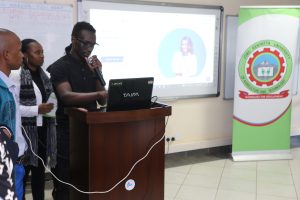Jomo Kenyatta University of Agriculture & Technology Students Innovate eHealth Solutions to Manage HIV/AIDS

Six brilliant digital health projects by JKUAT students were awarded Ksh 10,000 each for addressing challenges faced by patients living with HIV/ AIDS.
The projects, under the stewardship of JKUAT Digital Health Applied Research Center (DHARC), have been selected for incubation in a move aimed at leveraging digital tools in the health sector with a focus on the management of HIV and AIDS.
Running under the Kenya Health Management Information System project (KeHMIS), the award ceremony follows a month-long Bootcamp and hackathon that saw the multidisciplinary students mentored by a team from JKUAT Digital Health Applied Research Center (DHARC) and Palladium International.
DHARC Lead Researcher, Prof. Simon Karanja emphasized the need for such a hackathon explaining that the future of healthcare demands new approaches to creating solutions, building enterprises, and even shaping policy.
“Hackathons are necessary as they are the small cogs in the big wheel of innovation. The application of computing in healthcare can provide clarity to the challenges in the health sector, hence offering solutions in unfamiliar areas,” said Prof. Karanja.
The hackathon themed; ‘Emerging challenges and probable solutions in the use of eHealth to enhance decision-making for public health good in Kenya’ aimed to derive value from existing data and create functioning virtual applications based on six thematic challenges.
The Principal College of Health Sciences (COHES), Dr. Reuben Thuo, commended the students who were drawn from courses such as Mechatronics Engineering, Clinical Medicine, Epidemiology, Computer Science, Molecular Biology, and included international peers from Malawi and Uganda, for their relentless efforts during the Bootcamp.
The projects were geared towards addressing challenges such as clients interrupting their treatment, the inability to track the number and characteristics of active HIV clients on paper sites, the inability of Kenya to track HIV treatment changes, lack of standard ways to identify persons with an elevated risk of infection, lack of flexibility in enabling patients to pick up prescriptions, and streamlining chatbot features to support families of infected persons.
The multidisciplinary teams of students undertaking various courses at JKUAT developed systems guided by JKUAT faculty with experience in health research, statistics, mathematical modeling, and computing technologies focusing on machine learning and artificial intelligence.
From Left: JKUAT Students Ian Kiringa (Kenya) Shalyn Nabifo (Uganda) Nomsa Phiri (Malawi) display certificates awarded for their participation in the JKUAT DHARC Hackathon
The scalable, computer-based solutions created by the students demonstrated how digital systems in healthcare, guided by data-backed patient insights, can be part of a holistic, strategic framework thus improving clinical efficiency. The data used was available courtesy of previously compiled HIV prevalence and incidence data by different organizations.
Present during the meeting were Prof. Fred Wamunyokoli, Dr. Jane Aduda, Mr. Philip Oyier, Dr. Joseph Matheri, Dr. Susan Mwelu, Ms. Wairimu Gichaiya, Mr. Philip Kissinger (from DHARC), Dr. Kamande Lawrence (Nyahururu County Hospital), Mr. Charles Bett, Mr. Victor Ogutu and Mr. Evans Munene (all from Palladium International).




